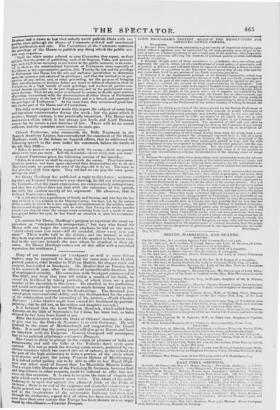LORD BROUGHAM'S PROTEST AGA1NaT THE RESOLUTIONS FOR COERCING LOWER CANADA,
Dissentient, 1. Because these resobitions, embracing a great variety or importaut atthjects. upon which ditTerent opiniotts limy be entertained by the eame persons. were all put to the vote at once, in a house cousisi hag of not a truth part nt the numbers that frequently attend alien questions affecting the interests of political parties or even individuals staud for di...cuss:um 2. Because, tholigh some of these resolutions .■ ie there are others, and especially the eight II, which set all considerations of soond policy, of generosity, and of justice. at defiance, sod still most likely be regamed as Militating a desi4n to crush whatever spirit id opeosition to the Executive Got es ument mac at any time and for any cause show it.or in any portiou of the North American provinces. 3. Pee:lose it is the fundamental principle vol the British Constitution. which was intended to be established in Canada by the act of l791. and e as lin:ill) promulgated in 1S31 that no part of the taxes levied upon Ow people shall be app!ied to any pur. pose St hatever al', hunt the consent of their representatives in Parliament ; and this coutrol over the revenue ought in ati especial manner to be vested in the people of the eel • .s, ti,eing that it Deter eau give them the same unlimited ientienoe which it confers mem the people of the parent state; for if supplies are a ithlteld by the Commons of England on account of et ievanee. the Crown has no otlwr resource, and the grirtauce 'nest he redress.' ; whereas, if the Commons of the colony withhold supplies for the like reasons, the Crown cannot by this proceeding he obliged to redress the grievance as long as the Parlianieut or the another country is willing to foolish the funds required. 4. !treatise the taking poisession of the money placed by the British Parliament at the disposal of the Coimimmul Councils, a idiom their consent, is wholly subversive of the atmement toned fundamental pi inciple, am' directly contrary to the wise. stint salu- tary provisions of the act passed in 1S3 1; nor thtes it at all signify that this is said only to be done upon the present °evasion, and that the rights of the Colobial Parlia. ment are represented as left unimpaired. The precedent ef sn still ever after be cited in support id slick oppressive proceedings as often as the Commons of ;my colony may a ithhold supplies, how justifiable suever their refusal may be, or iu a hatever de- signs the Executive Governnient may be engaged.
5. Because Ow constitution of the Council, having been tried for nearly half a cert. tory, has nut only tailed to produce lire ails autages expected from it. but, muter occa- sioning the most serious evils, has culled in bringing the legishithe operations of the Colonial Parliament to a close, and there seems good ground to hope that the evils now complained ot may he remedied bs iutrieliwitig the elective priiietple into the con- stitution of this body. under due modifications. But the fourth resolution seems to pledge Parliament against ever introducing tlind priliciplc, since it is hot possible to conceive any cireunistauces justifying its iutroductir u if the existing state of things does not.
6. Because the spirit in which these proceedings were conceived is avouedly adverse to the opinions and desires of a vast inajmity uf the inhalii■aills of i,rrus r Canada, and the no less plainly minted object in bringing them fore ard is by the authoritative de- clara • of Parliament to put down the principles and to thwart the inclinations se generally prevailing among the people of that piovibee. ';. l'ecanse these proceedings, so closely resembling the fat el measures that set ered the United States from Great Britain, have their might inn pi :Ind derive their support from reasonings, us luieiu fi,r14 a inoiligions contrast t• the a hole grounds, and the ouly ilefeswe of the policy during later sears so justly and so wisely sauctioned by the Impetial Parliament in ittlenttesterine the affairs ol the mother count ty. Nor is it easy to imagine, that the ittlitthilatits of either the American or the Europeau branches of ilin empire should contemplate Cr, strange a contrast witt t drawing inferences ill...entail discreditable to the character of the Legislature, and iujurions to the future salet y of the stale. When they mark mitt' what different measure we mete to 600,000 inhabitants of a 'emote provitice mirepiesented in Pailiament, nett to 6.u00,000 of our fellow citizens nearer home, and making themselves lward liy thew Representatives, the ionection mill assuredly arise in Canada. Mill may possibly find its any into imnud that the sacred tales of justice, the most worthy feelings of national generosity, and the soundest principles of enlightened policy may he appealed to tim vain, if the dein old of t he suitor be not also *ipported lq pelsonal interests and ',arty vices and political fears among those Wlitif.e aid he seeks; e law all men, pencils lug that many lam ruinshave Mewl themselves at liberty to huld a course tots:lathmimi inapentant but re. mote province which their constituents never would sutler to be pursued towards the inost inconsiderable borough in the United Kingdom, an impression will inevitably be inropagnited most dangerous to he maimenatice ml colonial dominion, that the people can never sandy intrust the powers or government to auy supreme authority out reeid• May 9, lls3-;.


























 Previous page
Previous page